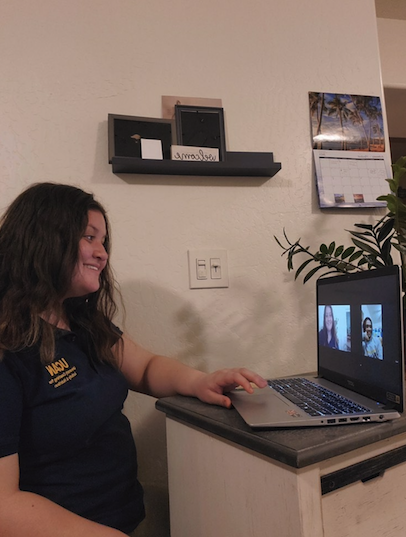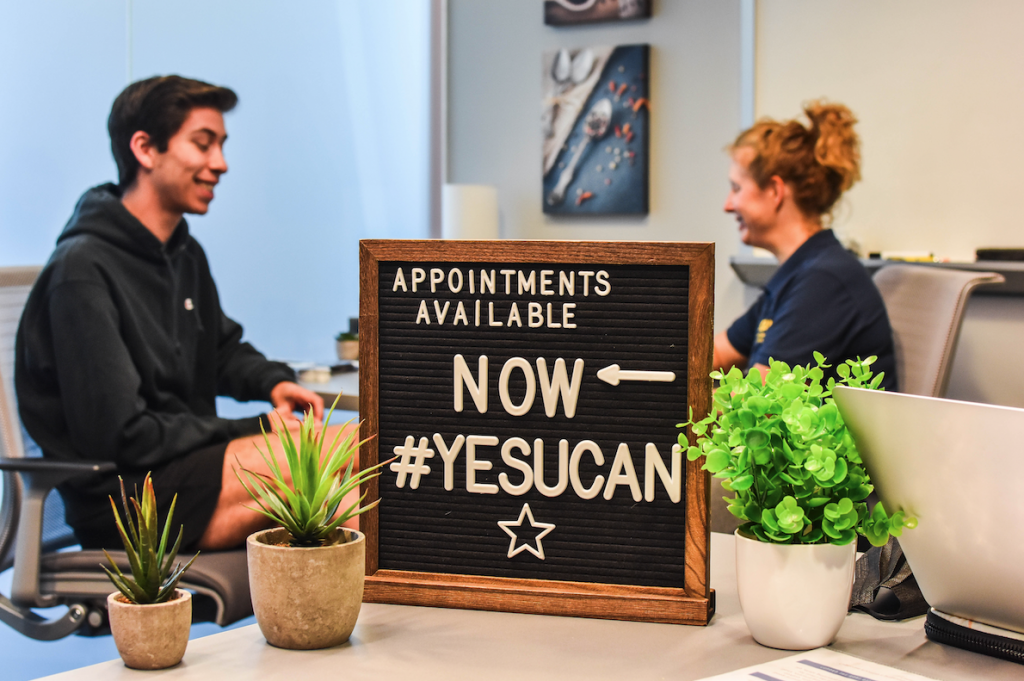It is no secret—the past 18 months have demonstrated how important building healthy, sustainable habits are to maintaining overall well-being. Getting started on that path can be tough, but NAU’s University Coaching for Activity and Nutrition program, better known as UCAN, is there to help the Lumberjack community get started on a healthier path.
“I think everyone needs a little bit of therapy in life,” senior Hannah Rahn said, one of the program’s veteran student health coaches. “UCAN is a great introduction into that setting.”
“A little bit of therapy” is about what UCAN is. UCAN heath coaches aren’t doctors, personal trainers, dietitians or licensed counselors; they’re students. And they aren’t there to help through major life overhauls. Rather, they can help students, faculty and staff who are looking for ways to make small adjustments to be happier, have better physical and mental health and respond to stress more productively. Coaches can teach breathing exercises and meditation or create plans and strategies for physical activity to manage stress.

It might be just what the doctor ordered.
Sometimes, people need a licensed therapist for high-level needs, but in other cases, someone could benefit from making a few minor tweaks to their days to help create self-care moments that reduce stress and anxiety. That’s where UCAN heath coaches step in. Health coaches offer 1:1 sessions to support clients whatever changes they are interested in making, using proven techniques for lasting behavioral change. The student health coaches gain real-world client experience and at the same time serve the campus community by providing students, faculty and staff the support and accountability of a coach for those who want to enhance self-care patterns but who don’t require a licensed therapist.
Rahn, who is studying psychological science with a minor in health coaching, said her experience with UCAN has solidified her choice in career, time and time again.
“I remember after my session coaching, I called my mom and said, ‘Mom, my first session was scary, but this is for sure what I want to do, I want to be a therapist,’” Rahn shared.
The coaches undergo 45 hours of training, including a semester-long class on motivational interviewing—the client-centered communication technique used by UCAN. Motivational interviewing is taught across disciplines including nursing, public health, dietetics, physical therapy, medicine, education and psychology, giving the UCAN coaches a major advantage for those who go into graduate training programs. Having already mastered the skills needed to experience positive outcomes with clients and patients and having plenty of client hours also makes them an asset to future employers.
Sara Scott, the student manager last year, graduated in May from the Nutrition and Foods program and went into her career with an increased confidence in her reflective listening skills and motivational interviewing training, making her a better listener and a better friend.
“I try to practice more reflective listening and elicit my peers’ personal reasons for change when they share goals they want to achieve,” she said. “We walk around every day throwing advice around like we can solve everyone’s problems, when in reality, everyone has the answers to their own problems.”

She said having someone to talk to and get support from in a non-judgmental space can make all the difference when trying to make behavior changes.
“The coaches feel like they’re making a major difference in their clients’ lives,” said Dawn Clifford, UCAN director and a professor in the Department of Health Sciences. “They realize that as a result of the sessions they lead, their clients experienced major healing in their relationship with food, feel more confident and accepting of their bodies and, because they changed their sleep habits, have more energy for other areas of their life.”
Scott remembers one particular session when she asked all the right questions and used her motivational interviewing skills, to ask her client why she wanted to make a change.
“There was a point in the session when the client got silent, said ‘wow, I’ve never thought about that before.’ And we sat in silence for a minute or two before we talked about this breakthrough and worked on setting her new goal. I walked out of that session feeling like I really helped them see that they have all of the answers and my role is to help them reach within themselves and find those.”
The ultimate goal for the UCAN program is to connect the NAU community with valuable resources to support holistic wellness. The first session is free and is available to students, faculty and staff on the Flagstaff Mountain Campus, statewide and online. After the first session, clients can purchase six 45 minute sessions throughout the semester for $20, making UCAN an affordable and accessible alternative to other clinical settings.
UCAN is one of various resources supporting holistic wellness as part of the Live Well NAU framework. By partnering with Counseling Services, Campus Health Services, Campus Recreation, Employee Assistance and Wellness and other departments throughout NAU, UCAN connects clients to other resources that support their health and well-being while also providing them with the tools to create concrete plans for making changes.
For more information about UCAN, read their health and wellness blogs. To sign up for a free health coaching session, visit UCAN’s registration page.

(928) 523-4789 | McKenzie.McLoughlin@nau.edu



